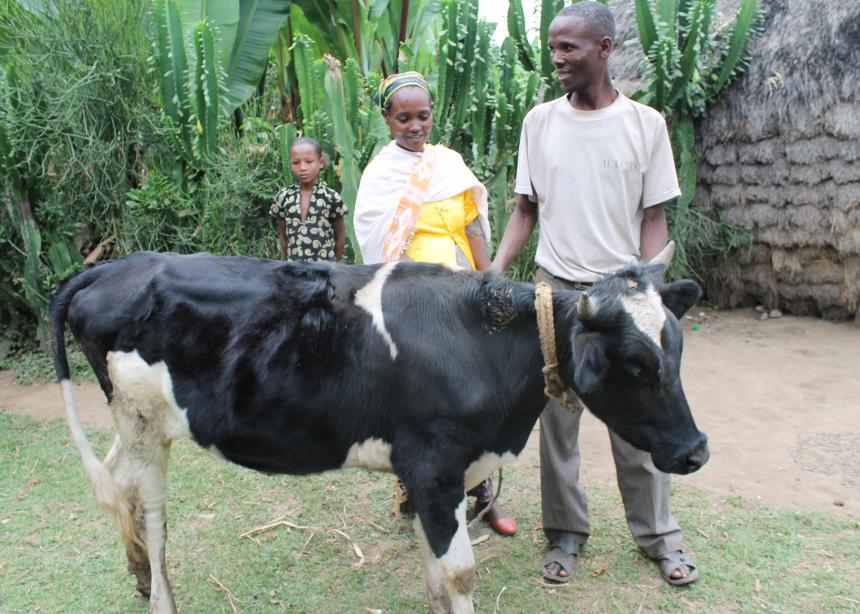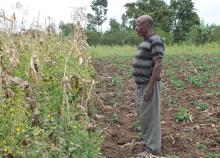Our Manitoba correspondent journeyed to Ethiopia last fall as part of a learning tour sponsored by Canadian Foodgrains Bank (CFGB). She reports her findings of the CFGB’s work with Mennonite Central Committee (MCC), Meserete Kristos Church (MKC), and other relief and development agencies in the story, “Reclaiming Ethiopia.” Following are profiles of two of the people she met.
Self-help
Shigute Edaso, 35, sits outside her home with a quiet dignity and serenity that amazes her international visitors. The birth of her fifth child is imminent, and the rugged dirt road that led to her home seems very remote. She is one of 120 women who have joined Self-Help Groups (SHG) formed by the relief and development arm of the Meserete Kristos Church and funded by MCC Ethiopia and CFGB in the Boricha Woreda district.
Edaso’s husband leads a heifer out of a treed enclosure, and she proudly shares how her involvement in the SHG has changed their lives. The 20 women in her SHG purchased a Holstein heifer, which is in her care. The improved breed gives her an extra source of income. Traditional cattle give 1 to 2 litres of milk per day. The Holstein gives 20 to 30 litres per day, with 70 percent of the profits going to Edaso and 30 percent to the SHG. The next calf will go to another woman in the group.
Acute malnutrition largely due to poverty has besieged the area, but generations ago this was an area with a robust dairy industry, said Sam Vander Ende, field staff for CFGB. “Due to population growth and erratic rains the industry disappeared.” Now, hope is being renewed, as women like Edaso are being empowered by SHGs, where they receive literacy classes, training regarding improved livestock breeds, and off-farm income diversification activities.
The women have generated a bank account in their SHG. “Before we had no savings, but now we have good savings. Our house was built with savings. Before I lived in a small hut. My life has improved through education and saving. Now I can read,” said Edaso. She is now supplementing the farm income by buying and trading coffee.
New farming methods
Gorma Esatu looks at a field of maize that he planted using conservation (CA) methods. He is back on his land after abandoning it several years ago, due to erosion and poor soil conditions. Today he is seeing good harvests come from his rehabilitated land. “I received training on new methods of farming,” he explains through a translator. “I covered the land with mulch and prepared compost. I received good quality seed.”
An important part of CA is to leave the crop stubble in the field as this will become mulch cover for the next season’s crop. Crop rotation is encouraged. Esatu will likely rotate the maize with a pulse/bean crop.
Farmers are learning to diversify their crops in the Boricha District. They are being provided with good quality seeds such as haricot beans through a cooperative seed bank that serves the community. Meseretes Kristos Church Relief and Development Association has partnered with CFGB to assist the farmers by teaching soil and water conservation methods and providing improved quality seeds, building roads, and rehabilitating severely eroded farmland through building terraces and check dams and planting trees.
“We are very happy now that we are able to feed our families and have roads that give us access to markets to sell our foodgrains,” Esatu said. Just as farmland is being resurrected from denuded and eroded hillsides, hope is being resurrected in the people of the Boricha District.
—Posted Jan. 20, 2015




Add new comment
Canadian Mennonite invites comments and encourages constructive discussion about our content. Actual full names (first and last) are required. Comments are moderated and may be edited. They will not appear online until approved and will be posted during business hours. Some comments may be reproduced in print.